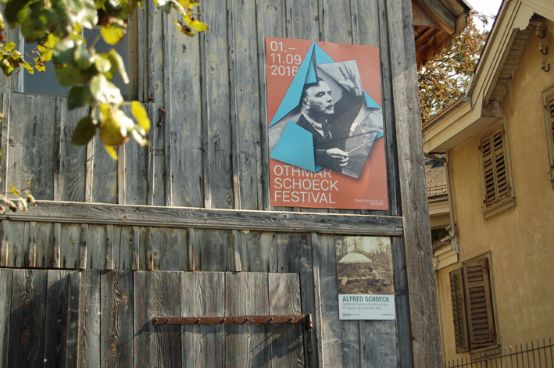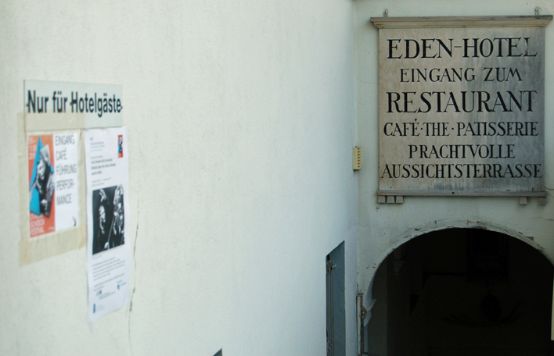A village "discovers" its composer
From September 1 to 11, the Othmar Schoeck Festival in Brunnen welcomed music lovers and renowned specialists. The main venue for the 35 events was the former Schoeck Hotel Eden and the Schoeck Villa with its studio.

"Othmar Schoeck would almost have been forgotten in the region, especially among the younger generation. The festival has successfully prevented this." These words accompanied the presentation of the Schwyz District Recognition Award to the volunteer festival board of trustees at the closing concert. This underlined the hope of many old and new Schoeck fans from near and far that the festival would give new impetus to the cultivation of Othmar Schoeck in whatever form. The diversity of approaches to this work was exemplified by the festival, which was widely reported in the local press (Bote der Urschweiz) and gave the stage to local ensembles in the opening concert. Works were performed that were either written for local music societies, had a local connection or were composed in Brunnen.
Environment
The exhibition in the Galerie am Leewasser on the life and work of Schoeck's father, the landscape painter Alfred Schoeck (1841-1931), provided the setting. It was the starting point on the journey to Othmar Schoeck (1886-1957), as the original locations of Schoeck's life are within sight: the Hotel Waldstätterhof, where Othmar's mother grew up, the villa high above the lake and next to it the Hotel Eden, both built by Schoeck's father, as well as the lake, forest and mountains. Othmar's seven great-nephews and -nieces were not afraid to open the doors of the villa to outsiders. There were guided tours of the studio, which has been preserved like a time capsule.
The Lwowski-Kronfoth music theater collective from Berlin was inspired by the hotel, house and garden as well as anecdotes and works of art. This resulted in the performance Othmar's haunted housewhich, with its fantastic scenery, offered Schoeck's music an extraordinary stage.
In the hall of the Hotel Eden, the appearance of the new Schwyz magazine which presents the correspondence between Hermann Hesse and Othmar Schoeck in full for the first time. The next day, Chris Walton outlined the life and work of the composer, rousing the audience in the packed Eden Hall to storms of enthusiasm.
Music
The announcement of an international competition for song duos was a good move to make Schoeck's outstanding song oeuvre better known. 13 ensembles each performed 12 to 14 songs. For most of these young musicians, this was their first encounter with Schoeck's work. If they continue to cultivate this repertoire, some of them will perhaps find their way to a simpler performance and clearer timbres, which is what makes many of the songs so magical.
The astonishing diversity of Schoeck's music could be heard in further concerts at the Grand Palais and the Hotel Waldstätterhof. The performance of the Notturnos op. 47 from 1933 by the Merel Quartet and Christian Hilz was the highlight for many.
Discussion
Finally, musicology enriched the festival with a three-day international symposium entitled "'As a Swiss I am neutral' - Schoeck's opera Dürande Castle". The libretto, based on Eichendorff's novella of the same name, was written by Hermann Burte. It is of dubious poetic quality and bristles with brown-tinted content. Premiered in Berlin in 1943, the opera was soon canceled there and was a failure in Zurich, damaging Schoeck's career. Thomas Gartmann is head of the project "Dürande Castle by Othmar Schoeck - Scenarios for an Interpretive Restoration" at Bern University of the Arts (HKB), which has been funded by the Swiss National Science Foundation since September 1, 2013. In this context, Francesco Miecieli was commissioned to revise the text - closer to Eichendorff - and Mario Venzago is responsible for the musical adaptations of the vocal parts. At the symposium, parts of the piece in the original version and the corresponding revised passages were performed in a workshop. This comparative listening testified to the quality of the interventions made.
Thomas Gartmann appreciated the direct confrontation with the work: "The fruitful discussions, objections, suggestions and approvals were very important: some things still flow into our presentations, arguments still need to be sharpened, insights put into perspective. The workshop on Saturday afternoon was particularly valuable. What was particularly important here was the realization that the new version is more acceptable and also has a positive influence on attitudes. This also gives courage for the realization of the planned performance."
Chris Walton, who was originally skeptical about the project, said after the symposium: "I am now convinced that the attempt is worthwhile and the new text seems good. But what is important to me is that the whole process is disclosed and discussed - as at the symposium. And I believe that a work has a life of its own after it has been written. In other words, you shouldn't shy away from 'de-burtefying' the work. However, I remain opposed to any staging of the original text."
Effect
Who knows, perhaps the Brunner Festival was able to air out the artistic and academic reception of Schoeck's oeuvre in all its diversity. It was certainly stimulating. For 2018, the HKB is planning publications that tie in with the symposium as well as a CD production of the new version of Dürande Castle. And the Board of Trustees also wants to stay on the ball - they are talking about further developing the "Othmar Schoeck label".
Documentation
-

Not just for insiders: Othmar Schoeck's music must not disappear into oblivion. This door led to the Eden Hall, where the symposium and other events took place. Photo: Katrin Spelinova








